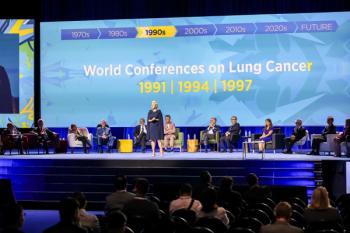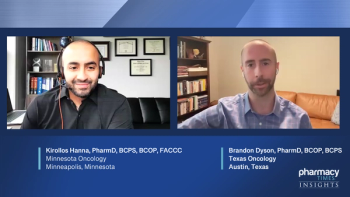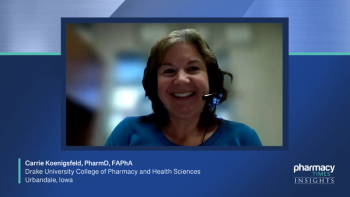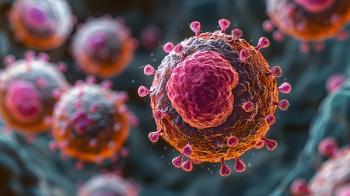
Two MUSC pharmacists describe how pharmacists are often the educational resource for patients and can help when removing certain barriers to care.

Two MUSC pharmacists describe how pharmacists are often the educational resource for patients and can help when removing certain barriers to care.

At the 2024 World Conference on Lung Cancer, Ana Baramidze, MD, PhD, presented 5-year outcomes of the trial, which investigated cemiplimab monotherapy in first-line advanced non–small cell lung cancer (NSCLC) with PD-L1 expression of 50% or greater.

At the 2024 World Conference on Lung Cancer, Benjamin Besse, MD, PhD, discussed the findings of the phase 3 CARMEN-LCO3 trial, which led to the discontinuation of the study drug by the manufacturer.

Teresa Messick, PharmD discusses how meeting patients “where they are” and supporting them holistically through medication and beyond is the most rewarding part of the profession.

The discussion explores how Medicare's Part D smoothing program in 2025 might impact chronic lymphocytic leukemia patients’ access to and adherence to Bruton tyrosine kinase inhibitor therapies and how pharmacists can help navigate this new program. The session concludes with closing remarks.

Carrie Koenigsfeld, PharmD, FAPhA, discusses an overview of RSV, including its transmission, incidence, seasonality, and clinical presentation.

Panelists discuss how various patient characteristics, including age, fitness level, cytogenetic risk, and comorbidities, influence their decision to use more intensive quadruplet regimens like D-VRd (daratumumab plus bortezomib, lenalidomide, and dexamethasone) vs standard triplet regimens, such as VRd or KRd (carfilzomib, lenalidomide, and dexamethasone) in transplant-eligible multiple myeloma patients, while also considering administration logistics and supportive care requirements

Panelists discuss how transplant eligibility significantly influences first-line treatment goals and initial therapy selection in multiple myeloma, often leading to more intensive induction regimens aimed at achieving deep remissions.

As American Pharmacists Month begins, Alan Corley talks the importance of pharmacists and the value of the profession personally and to the overall community.

The benefits of the daratumumab-based regimen were seen in all patients, including those with high and standard cytogenic risk levels.

Karen Merrill discusses her experiences in pharmacy with plans to celebrate her niece, a first-year pharmacist.

C. diff survivor and Peggy Lillis Foundation Board Member Maryann Webb discusses how her experience with the infection encouraged her to advocate for patients who are struggling to advocate for themselves.

Alan Corley, pharmacy owner in Greenville, TN, reflects on the changes he's witnessed throughout his career and the most rewarding aspects of his profession.

The discussion addresses the economic impact of appropriate dose modifications on chronic lymphocytic leukemia management.

The discussion covers when to consider transitioning to a new therapeutic option in CLL and the factors that influence the decision between dose modification and switching therapies.

Ashraf Badros, MBCHB, discussed new data from the AURIGA study presented at the International Myeloma Society 2024 Annual Meeting, happening September 25 through 29 in Rio de Janeiro, Brazil.

The trial is evaluating ciltacabtagene autoleucel (cilta-cel, Carvykti; Johnson & Johnson) in patients with relapsed and lenalidomide-refractory multiple myeloma.

Ashraf Badros, MBCHB, discussed findings from the AURIGA study being presented at the International Myeloma Society 2024 Annual Meeting, happening September 25 through 29 in Rio de Janeiro, Brazil.

Banerjee also discussed data being presented at the International Myeloma Society 2024 Annual Meeting that he is particularly excited for this year.

The CEPHEUS trial also highlights the importance of minimal residual disease (MRD) as a study end point.

Using biosimilars and generics as well as getting patients connected with manufacturer copay assistance or grant programs can reduce their out-of-pocket costs.

Panelists discuss how their institutions approach frontline treatment for transplant-eligible multiple myeloma patients, typically using a combination of novel agents like proteasome inhibitors and immunomodulatory drugs, followed by autologous stem cell transplantation and maintenance therapy, while considering factors such as patient characteristics and treatment response to guide therapy sequencing.

Panelists discuss how the current first-line treatment options for transplant-eligible patients with newly diagnosed multiple myeloma (NDMM) typically involve combination therapies including proteasome inhibitors, immunomodulatory drugs, and steroids.

Clayton Irvine, PharmD, MBA, MS, notes that although these options help to lower the cost of care, quick, widespread implementation remains difficult.

Rahul Banerjee, MD, FACP, discussed his presentation at the International Myeloma Society 2024 Annual Meeting on available T cell-directed therapies for myeloma treatment, including CAR T-cell therapies and bispecific antibodies.

Banerjee addressed factors to consider when selecting a regimen, the available treatments in this category, and their key differences.

Automation and artificial intelligence can also aid significantly in reducing time-consuming tasks and improving efficiency for pharmacists, allowing them more time with patients.

Although Madabhushi said there are emerging tools for clinical decision support, he said there is a greater need for tools further downstream in the post-diagnosis stages.

As the end of the DSCSA stabilization period approaches, Josh Bolin from the NABP provides an overview of what to expect.

Pharmacy students discuss a non-traditional learning assignment that used the social media platform, TikTok.